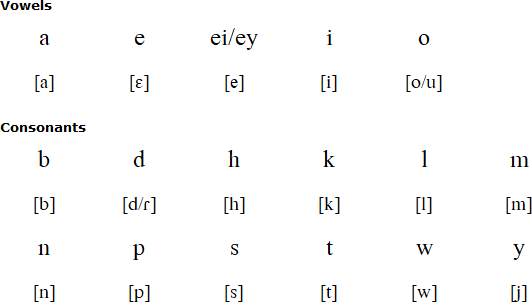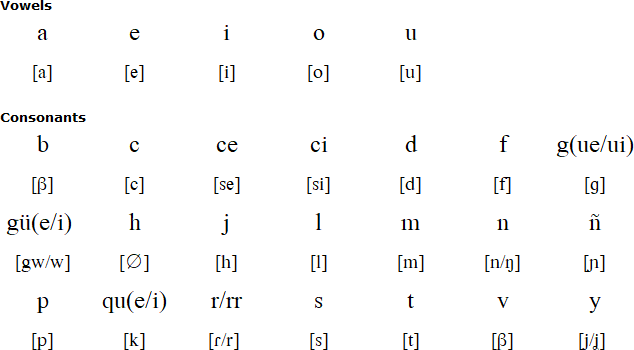Taíno is an Arawakan language that was once spoken throughout the Caribbean. Classic (Eastern) Taíno was spoken mainly in central Hispaniola, Puerto Rico, the Turks and Caicos Islands and the northern Leeward Islands. The Ciboney dialect, or Western Taíno, was spoken in western Hispaniola, the Bahamas, Jamaica and most of Cuba. It is thought that the language ceased to spoken within 100 years of the Spanish colonisation of the region, which began in 1492. However, Taíno possibly continued to be spoken in a few isolated areas, particularly in Cuba, until the late 19th century.
According to Christopher Columbus, various more or less mutually intelligible dialects of Taíno were spoken from the Bahamas to Cuba, and from Boriquen (Puerto Rico) to Jamaica.
Many Taíno words were borrowed into the Spanish spoken in the Caribbean region, particularly for flora and fauna, place names, geographical names and personal names. Examples include: Boriken, from boriken / boriquen (Puerto Rico - 'native land'), Haiti, from ha-yi-ti ('land of mountains), and Jamaica, from Ya-mah-ye-ka ('great spirt of the land of man'). Some Taíno words ended up in English as well, including: Caribbean, barbeque, hammock, canoe, guava, cannibal, hurricane, maize, potato, tobacco and savannah.
Efforts are currently underway to revive Taíno, and about 30 people have learnt a reconstructed version of the language. There are projects to revive Puerto Rican Taíno by Dr Javier Hernandez in Puerto Rico, and the Taíno of the Dominican Republic (Taíno-Quisqueyanaíqui), by Desmond Johnson Montes De Oca.


The letters ce, ci and v only occur in loan words.
Download alphabet charts for Taíno (Excel)
Guaseñor, jarí aro'cielo buca,
tocá'bucanulia pila;
anta'bureynarás,
tocá'buquén aguaca,
aro'Queo miya naca aro'cielo,
apa'guapane-caí caguaquía,
je tachigua'guaquía mon'bucain alín'guacainjalanago,
miya guatachigua mon'guacain jarí nacainjalagua equi'guaquía;
je maquequipi'guaquía aro'moén
caisa agüitiragua'guaquía mon'yoluja
amen.
Hear a recording of this text by Desmond Johnson Montes De Oca
Tachínago je guana aro'jatocá je aro'jarotánago juruco asaránago najemeigua. Apacana eincai je aincai natocá je aro'aine jaipaya nacacagua.
Hear a recording of this text by Desmond Johnson Montes De Oca
All human beings are born free and equal in dignity and rights. They are endowed with reason and conscience and should act towards one another in a spirit of brotherhood.
(Article 1 of the Universal Declaration of Human Rights)
Information about Taíno
https://en.wikipedia.org/wiki/Ta%C3%ADno_language
https://indigenouscaribbean.files.wordpress.com/2008/05/davidcampos.pdf
http://www.taino-tribe.org/tedict.html
http://www.native-languages.org/taino.htm
Achagua, Apurinã, Arawak, Asháninka, Ashéninka, Baniwa, Baniwa of Guainía, Baure, Caquinte, Chamicuro, Curripaco, Enawene Nawe, Garifuna, Iñapari, Machiguenga, Nanti, Nomatsiguenga, Palikúr, Paraujuano, Paresi, Pauna, Piapoco, Taíno, Tariana, Terêna, Wapishana, Wayuu, Yanesha', Yine, Yucuna
Languages written with the Latin alphabet
Page last modified: 24.05.24
[top]
You can support this site by Buying Me A Coffee, and if you like what you see on this page, you can use the buttons below to share it with people you know.

If you like this site and find it useful, you can support it by making a donation via PayPal or Patreon, or by contributing in other ways. Omniglot is how I make my living.
Note: all links on this site to Amazon.com, Amazon.co.uk
and Amazon.fr
are affiliate links. This means I earn a commission if you click on any of them and buy something. So by clicking on these links you can help to support this site.
[top]